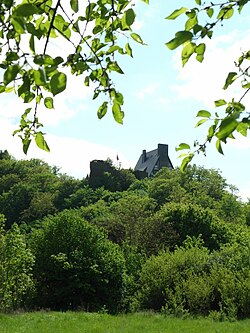Waldeck Castle
| Waldeck Castle | |
|---|---|
| Burg Waldeck | |
| Dorweiler | |

Burg Waldeck im Hunsrück: Ruine der Oberburg mit modernen Neubauten des Nerother Wandervogels
|
|
| Coordinates | 50°08′58″N 7°26′00″E / 50.1495°N 7.4332°ECoordinates: 50°08′58″N 7°26′00″E / 50.1495°N 7.4332°E |
| Type | hill castle, spur castle |
| Code | DE-RP |
| Height | 248 m above sea level (NN) |
| Site information | |
| Condition | ruin |
| Site history | |
| Built | 1189 |
| Garrison information | |
| Occupants | ministeriales |
Waldeck Castle within the limits of the village of Dorweiler in Dommershausen in the Rhein-Hunsrück-Kreis (district) in Rhineland-Palatinate was the main seat of the Hunsrück family of Boos.
The ruin lies high above the Baybach valley. William I of Heinzenberg built the fortress in 1150 and, in so doing, established the "Boos-Waldeck" family which was later to become widespread.
The mediaeval castle endured several wars, and was partially destroyed by the French in 1689 during the course of the Nine Years' War, known in Germany as the War of the Palatine Succession (Pfälzischer Erbfolgekrieg).
The castle was used until 1833 when the family of Boos von Waldeck sold its holdings in the Rhineland.
The first documentary mention of a castle in the vicinity of today's ruins dates to the year 1243. In that document, the knights – Heribert, Udo (Rudolf) and Winand (surnames Boos von Waldeck, Boose of Walthecce) – gave their castle Elector of Cologne, Konrad von Hochstaden, who in turn enfeoffed them. Around 1250, Rudolf (Udo) Boos von Waldeck built the lower bailey and both wards are mentioned in a document in 1285.
The archbishop authorized the family to act as landlords of the area, through commercial contracts with Cologne, thus establishing the aristocratic line of the family that endured until 1833. This main seat would be the central administration of mills, offices, and the residence for barons, counts, and noble visitors during the summer. Political connections through deals, commerce and military control against the French guaranteed almost six hundred years of influence.
The surname Boos is related to ancient mediaeval German words meaning "lead", "nobleman", or "angry", possibly used to indicate the residents of the castle, hence the name variation "Castle of Boos-Waldeck" seen in some documents. In French it is cited as the castle of "Bois Walthecce" or "Boosse de Walthecce".
...
Wikipedia

